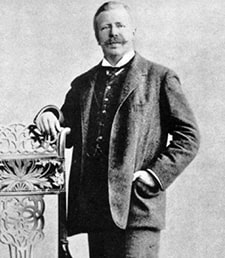Jakob Johann Freiherr von Uexküll (1864 – 1944) was a Baltic German biologist who worked in the fields of muscular physiology and animal behaviour studies and was an influence on the cybernetics of life. However, his most notable contribution is the notion of Umwelt, and his works established biosemiotics as a field of research.
Jakob von Uexkül was born in Keblast (today Mihkli), Estonia on September 8, 1864. He studied zoology at the University of Dorpat (now Tartu) from 1884 to 1889, and physiology of animal locomotion at the University of Heidelberg from 1837 to 1900. In 1907, he was given an honorary doctorate from the University of Heidelberg for his work on muscular physiology.
Uexkull began to think differently about biology, and started to believe that things like organisms and cells are more complex than we thought. He believed that each species has its own unique way of seeing the world, which affects its behavior. He argued that the environment is not a fixed, objective world that is shared by all species, but that it is formed based on what each species experiences. In his Umwelt und Innenwelt der Tiere (1909), he labeled this subjectively perceived world of living organisms as Umwelt.
In 1924, he was hired as an adjunct lecturer at the University of Hamburg. The university allowed him to establish the Institut for Environmental Research, but the room was actually a store selling cigarettes in an aquarium. Although he was not given the attention he deserved, he was praised by philosophers, including Ernst Cassirer, Ortega y Gasset, and Max Scheler, and through Scheler, biologists such as Konrad Lorenz and Ludwig von Bertalanffy.
Uexkull’s ideas have had a big impact on philosophers who study anthropology (such as Helmuth Plessner, Arnold Gehlen, and Martin Heidegger), as well as phenomenologists such as Maurice Merleau-Ponty. Uexkull was critical of the Nazi regime, and so he moved to Capri island in 1940. Uexkull died on Capri island after 4 years of living there and remains an influential biologist and philosopher with his works in today’s time.


